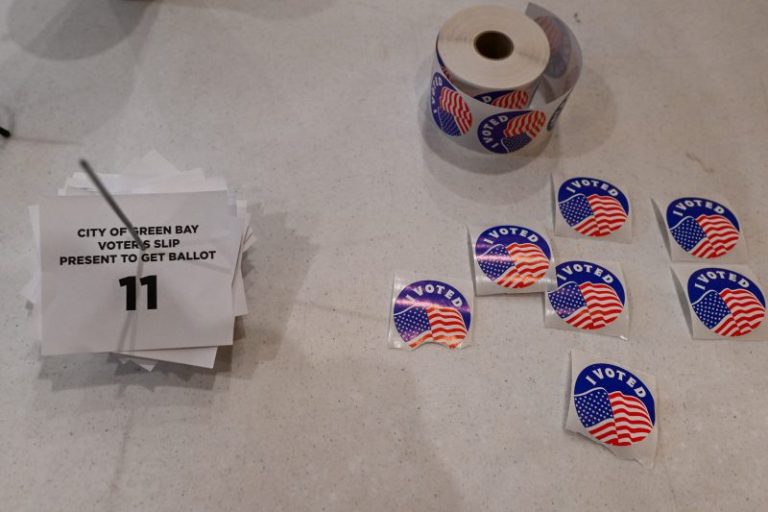MADISON, Wis. — Wisconsin voters opted Tuesday to ban private funding for election administration, joining more than two dozen states that have ended or limited the practice after Facebook founder Mark Zuckerberg and his wife spent $350 million to help local governments run elections during the coronavirus pandemic.
Voters approved an amendment to the state constitution to ban the donations, according to a tally of unofficial results by the Associated Press. They also approved a second proposal that limits who can perform election-related duties. Both measures were initiated by Republican state legislators.
Zuckerberg and his wife, Priscilla Chan, were the primary funders of the Center for Tech and Civic Life, which gave grants to election administrators around the country in 2020 so they could expand their mail voting operations, set up curbside voting programs, and purchase ballot tabulators, face masks and other supplies.
Zuckerberg, Chan and the center said the increased funding was needed because costs skyrocketed for local officials during the pandemic as voters turned to mail voting in unprecedented numbers. A spokesman for the couple has since called the funding a one-time effort and said they did not plan to fund election operations again.
Republicans balked at the arrangement and have pushed to prevent similar grants from being used in future elections. They denounced the donations as “Zuckerbucks” that were designed to help Democrats because urban areas packed with liberal voters received the largest grants. The center denied the allegations, saying that it funded every legitimate grant application it received and that it provided funds to election administrators in Republican, Democratic and swing jurisdictions.
Since the 2020 election, 27 other states have prohibited or limited such grants, according to the nonpartisan National Conference of State Legislatures. In Wisconsin, a swing state that is likely to be crucial to the outcome in the presidential race, Republicans who control the legislature asked voters to amend the state constitution to ban the grants after Gov. Tony Evers (D) vetoed their initial attempt to halt private funding for elections.
Tuesday’s vote came soon after the Milwaukee Election Commission received a $787,000 grant from the nonprofit Cities Forward. The commission’s executive director, Claire Woodall-Vogg, said she welcomed the funding because the state and federal governments aren’t spending enough to ensure elections run smoothly. Most of the funding has been allocated, she said, and she intended to spend it all before the constitutional amendment takes effect when the state certifies the vote totals in the coming weeks.
The funds are being used on various expenses, including security cameras and two electric pallet jacks to move election equipment.
“I have absolutely no reservations about applying [for] and receiving the funding,” she said Tuesday. “We have major budget constraints.”
The Center for Tech and Civic Life has said it provided funds to 2,500 election agencies around the country in 2020. In Wisconsin, communities received more than $10 million. The bulk of it — nearly $9 million — went to Milwaukee and the state’s next four largest cities, which are heavily populated by Democrats.
The proposals to amend the constitution got little attention overall, and with the top of the ticket for both parties already settled, turnout in Wisconsin’s Tuesday primary was light. But Republicans had supported the measures, and Democrats argued against them.
“Wisconsin elections shouldn’t be run by unaccountable out-of-state organizations using private money,” state Sen. Eric Wimberger (R), a sponsor of the amendment, said in an online video. “They should be run by local nonpartisan officials and paid for by the community.”
Ben Wikler, chairman of the state Democratic Party, urged people to vote against the measure, calling the changes to the constitution an attempt to “meddle in election administration and leave local governments with fewer resources to keep polling places open.”
Ryan Tracy, 28, said after voting at a library on Tuesday in Madison that he supported the ban on private funding because he believes the government should pay for elections on its own.
“You at least like to think that the government has accountability,” he said. “Once you start getting into third-party contractors, the chain of blame gets a lot more hazy. And also, I personally wouldn’t want to put our election processes in the hands of someone like Mark Zuckerberg.”
Wisconsinites voted on two changes to the constitution — one to ban private grants and one to stipulate that election duties must be performed only by “election officials designated by law.”
The second measure was aimed at preventing local governments from getting help from consultants, who advised election officials in Green Bay in 2020. Critics have contended that the prohibition is vague and could interfere with election officials’ ability to hire vendors to print ballots and supply voting machines.
Woodall-Vogg said she did not think the change regarding who can work on elections would have much effect on how the city operates its elections. But she said it could make it harder to fix jammed voting machines on Election Day because city workers may have to repair them instead of letting more experienced voting machine vendors do that work.
Joe Muellenberg, 41, voted against the measure on who can perform election duties because he said he feared it could make it harder to staff polling places. He voted for the ban on private funding, saying it “seems more equitable” but also acknowledged such donations could save taxpayers money.
“It could be good,” he said of private funding, “but it could be a slippery slope.”

